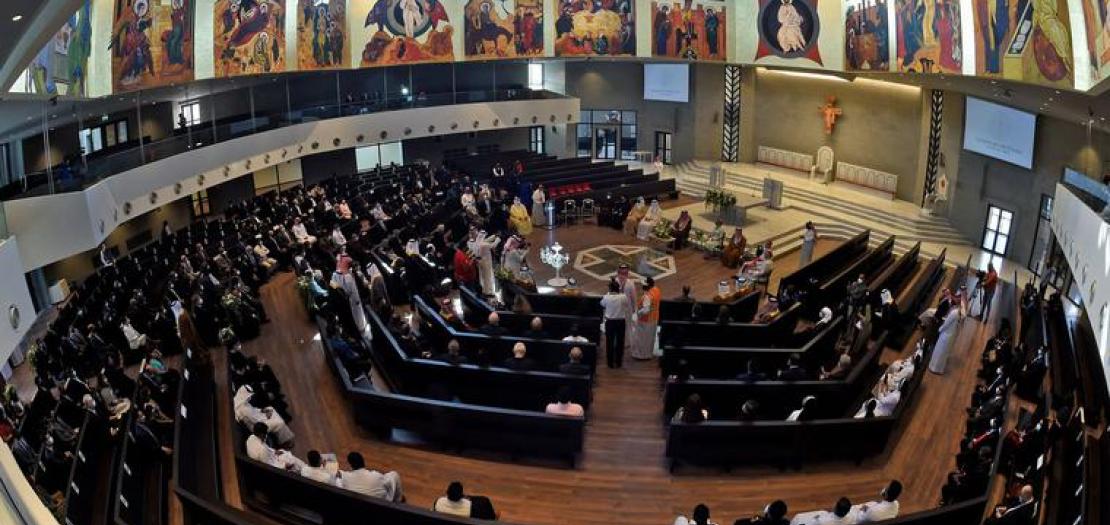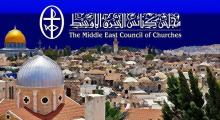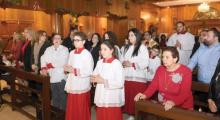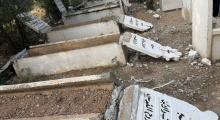Issued by the Catholic Center for Studies and Media - Jordan. Editor-in-chief Fr. Rif'at Bader - موقع أبونا abouna.org

The consecration of the first cathedral in the Kingdom of Bahrain marks the latest advance in religious tolerance, although the number of churches in the Arab nation continues to be few, despite a burgeoning immigrant Catholic population.
On December 10, 2021 Cardinal Luis Tagle, prefect of the Vatican Congregation for the Evangelization of Peoples, consecrated the Cathedral of Our Lady of Arabia in Awali, in central Bahrain, describing the new church as “a living sign of God’s care for His flock.”
A day earlier, King Hamad Ibn Isa Al Khalifa of Bahrain inaugurated the 95,000-square-foot, ark-shaped cathedral, which has a seating capacity of 2,300. The king donated the land to the Church in 2013, and the decision to build the church there was begun on February 11 that year — the feast of Our Lady of Lourdes. Construction began in 2018.
The new cathedral is expected to be much in demand. Bahrain is home to about 80,000 Catholics, many of whom are immigrant workers from Asia, particularly the Philippines and India. But like many other countries in the Gulf, they suffer from a severe shortage of churches.
Until now, Bahrain had just two parishes, namely the Sacred Heart in Manama, the kingdom’s capital, which is the oldest church in the region (opened in 1940), and a much smaller “outstation church” of Our Lady of the Visitation in Awali, 12 miles away from Manama.
These two churches were “insufficient to meet the needs of the Catholic population,” Bishop Paul Hinder, who administers the churches in Bahrain, told the Register. “Therefore, for Catholics in Bahrain, the new church will be very welcome.”
Bishop Hinder, a 79-year-old Swiss Capuchin, tends to the faithful across the entire Arabian Peninsula. As vicar apostolic of Southern Arabia based in Abu Dhabi, his flock resides in the United Arab Emirates (UAE), Oman and Yemen. But since last year, he has taken on responsibility for also serving the faithful in northern Arabia (Qatar, Kuwait, Bahrain and Saudi Arabia), temporarily administering the vast area after the former apostolic vicar, Bishop Camillo Ballin, an Italian-born Comboni missionary, died last year at the age of 75.
Under Bishop Ballin’s watch, Bahrain grew to prominence, after the vicariate’s seat was transferred there from Kuwait in 2012. Bishop Ballin, who became a Bahraini citizen, believed the kingdom would be a better “base from which to reach out more effectively to Catholics within the other countries in the vicariate,” according to Bishop Hinder.
In his address at the cathedral’s inauguration, Bishop Hinder noted how Bahrain became the “hub for the pastoral care of the Catholics residing on the shores of the Arabian Gulf,” replacing Aden, the Yemeni capital, in the first half of the 20th century. “It was possible only because of the openness of the ruler of Bahrain,” Bishop Hinder said.
“A church for the expatriate Catholics from the Philippines and India is a kind gesture, but it doesn’t have any larger significance unless the native Christians and converts to the faith are allowed in,” he said.
Bishop Hinder sees the new cathedral as “a strong message of tolerance and openness” and noted various achievements that have paved the way for the new cathedral, especially the king of Bahrain’s visit to Pope Francis in 2014, when the king invited Francis to visit the country.
“This special invitation marked the beginning of a new shift in the relation between the followers of Islam in the Arabian Peninsula and the Catholic Church,” Bishop Hinder said.
He also noted the Holy Father’s visit to the United Arab Emirates in 2019, his signing there of his “Human Fraternity” document with the grand imam of Al-Azhar University, and similar later visits to Morocco and Iraq.
“The freedom to practise one’s faith and to profess it in the public domain is a basic human right,” Bishop Hinder said. “Within the different Islamic Gulf countries, this fundamental right is being increasingly recognized,” he observed, adding that the Gulf states “are being more vocal about the importance of tolerance and how it is practiced within their societies.”
By constructing this new cathedral, he also believes “this gesture will have its impact on the neighboring countries.”







